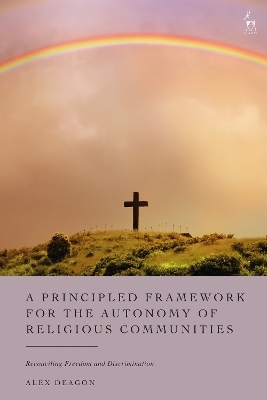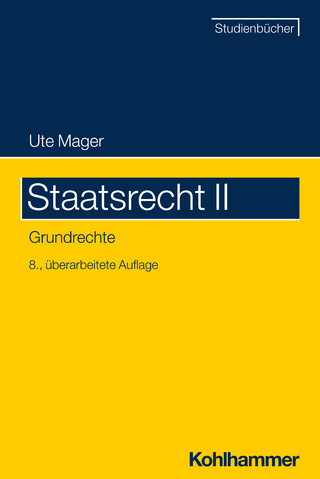
A Principled Framework for the Autonomy of Religious Communities
Hart Publishing (Verlag)
978-1-5099-5063-8 (ISBN)
It develops a new framework for reconciling religious freedom and discrimination in Western liberal democracies and presents a unique approach to practically supporting both religious freedom and equality as fundamentally important objectives which promote more compassionate and cohesive communities.
The book applies the idea of peaceful coexistence of difference by assuming the dignity and goodwill of different people and perspectives, and proceeds upon shared virtues such as love which are affirmed by all.
Alex Deagon is Senior Lecturer at the Faculty of Law, Queensland University of Technology, Australia.
PART I
RELIGIOUS FREEDOM VERSUS ANTI-DISCRIMINATION?
Introduction
I. The Purpose of this Book: Reconciling Freedom and Discrimination
II. Religious Freedom and Equality: A Tense Relationship
III. Shortcomings in the Literature
IV. Peaceful Coexistence, Shared Premises and Political Virtues
V. Models of the Religion-State Relationship
VI. Structure of the Book
PART II
LEGAL FRAMEWORKS
1. Australia
I. Introduction
II. The Australian Constitution
III. Commonwealth Legislation
IV. Summary: The Legal Infrastructure for the Autonomy of Religious Communities in Australia
V. Evaluation of the Law: Peaceful Coexistence and the Theological Virtues
VI. Conclusion: The Autonomy of Religious Communities in Australian Law
2. United States
I. Introduction
II. The First Amendment of the US Constitution
III. Federal Legislation
IV. Summary: The Legal Infrastructure for the Autonomy of Religious Communities in the US
V. Evaluation of the Law: Peaceful Coexistence and the Theological Virtues
VI. Conclusion: The Autonomy of Religious Communities in US Law
3. England
I. Introduction
II. European Convention of Human Rights
III. UK Legislation
IV. Summary: The Legal Infrastructure for the Autonomy of Religious Communities in England
V. Evaluation of the Law: Peaceful Coexistence and the Theological Virtues
VI. Conclusion: The Autonomy of Religious Communities in English Law
PART III
THEORETICAL FRAMEWORKS
4. Australia: Pragmatic Pluralism or Mild Establishment?
I. Introduction
II. Australia as Pragmatically Pluralist
III. Evaluation of Australia’s Pragmatic Pluralism
IV. Proposing an Alternative: Mild Establishment?
V. Implications for Australia’s Legal Framework
VI. Conclusion
5. United States: Secularism or Pluralism?
I. Introduction
II. United States as Secular Separationist
III. Evaluation of Secular Separationism in the US
IV. Proposing an Alternative: Pluralism
V. Implications for the United States Legal Framework
VI. Conclusion
6. England: Substantive Establishment?
I. Introduction
II. Elements of English Establishment
III. Nature of English Establishment: Substantive (Theological) or Formal (Secular)?
IV. Peaceful Coexistence and an Evaluation of English Establishment
V. Implications for the English Legal Framework
VI. Conclusion
PART IV
A PRINCIPLED FRAMEWORK
7. Reconciling Religious Freedom and Equality in a Principled Framework
I. Introduction
II. Reconciling Religious Freedom and Equality
III. Recommendations
| Erscheinungsdatum | 13.02.2023 |
|---|---|
| Verlagsort | Oxford |
| Sprache | englisch |
| Maße | 156 x 234 mm |
| Themenwelt | Recht / Steuern ► Allgemeines / Lexika |
| Recht / Steuern ► EU / Internationales Recht | |
| Recht / Steuern ► Öffentliches Recht ► Verfassungsrecht | |
| ISBN-10 | 1-5099-5063-X / 150995063X |
| ISBN-13 | 978-1-5099-5063-8 / 9781509950638 |
| Zustand | Neuware |
| Informationen gemäß Produktsicherheitsverordnung (GPSR) | |
| Haben Sie eine Frage zum Produkt? |
aus dem Bereich


